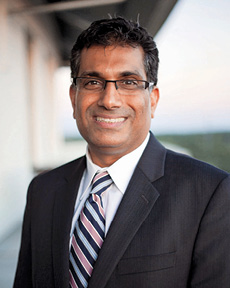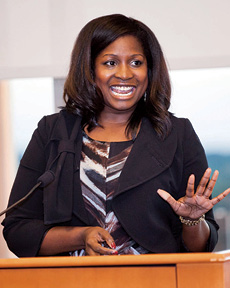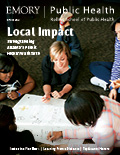The Best Jobs in the World

“Teaching exposes me to some brilliant students. I’m always learning from them,” says Ali S. Khan, director of the Office of Public Health Preparedness and Response at CDC and an adjunct faculty member. |
The RSPH Alumni Association honors two CDC leaders in public health preparedness and sickle cell disease
Ali S. Khan – Distinguished Achievement Award
A few years ago, Ali S. Khan 00MPH had to decide whether to give up teaching or practicing medicine. His duties as director of CDC’s Office of Public Health Preparedness and Response and U.S. assistant surgeon general didn’t leave time for both. Fortunately for Rollins, Khan chose to remain in the classroom.
“Teaching exposes me to some brilliant students,” says Khan, who co-teaches the course, Emerging Infectious Diseases. “I’m always learning from them.”
Guiding students in and outside the classroom is one of the many accomplishments for which Khan received the 2011 Distinguished Achievement Award. It was the first time the award was given to a current faculty member and commencement speaker. Khan addressed the Class of 2011 last May.
The popular teacher and CDC leader grew up wanting to become a physician. Near the end of his residency in internal medicine and pediatrics at the University of Michigan, one of his mentors steered him toward public health. In 1991, Khan joined the Epidemic Intelligence Service (EIS) at CDC.
Since then, Khan has been instrumental in upgrading local, state, and national public health systems to detect and rapidly respond to bioterrorism. He also created the critical agent list, forming the basis for biological terrorism preparedness. When the nation’s first anthrax attack occurred in 2001, Khan directed CDC's operational response in Washington, D.C.
He also has led responses to other public health emergencies, including Ebola hemorrhagic fever, the Asian tsunami, and the initial response to Hurricane Katrina. He designed CDC’s joint global field epidemiology and laboratory training program and participated in the eradication of Guinea worm disease and polio. He also helped design and implement the President’s Malaria Initiative.
Through it all, he has maintained close ties to Rollins by mentoring students, participating on the Alumni Campaign Committee, and serving as RSPH Alumni Board president.
Khan credits his EIS training in surveillance and his studies in biostatistics at Rollins as the basis for his public health accomplishments. Both prepared him for a leadership role that he relishes.
“I have the best job in the United States—ensuring the health security of the nation,” he says.

As a student at Rollins, Melissa Creary co-founded the nonprofit Shadow Blossom, which tackles hidden health and social issues. |
Melissa Creary – Matthew Lee Girvin Award
Melissa Creary 00C 04MPH first worked on sickle cell disease in the laboratory, where she made a discovery: She wanted to work more with people than with cells.
That revelation led her to take a community approach as a health scientist with CDC’s Division of Blood Disorders, for which she has received much recognition, including the 2011 Matthew Lee Girvin Award, honoring younger graduates who improve the lives of others. Girvin, a 1994 alumnus, died in a 2001 helicopter crash while on a U.N. surveying mission in Mongolia.
Within her first year at CDC, Creary helped launch a working group that created a community of agency experts. She developed award-winning web pages; created partnerships with health care providers, researchers, and community groups; and published a paper that she and her colleagues presented at professional meetings. Her paper captured the attention of the National Heart, Lung, and Blood Institute, with which she is collaborating on a two-year national pilot program to determine the prevalence of sickle cell disease and other inherited blood disorders.
Creary, who was diagnosed with sickle cell disease when she was 3, views the pilot project as a platform for spreading information and improving current interventions to combat a disease once believed to affect only blacks. The disease in fact affects people of different races and ethnic backgrounds.
Outside of CDC, Creary is a board member with Sickle Cell Empowerment for Liberated Life, former chair of the Caucus of Emory Black Alumni, and a fund-raiser for the Susan G. Komen Foundation. She remains active in ShadowBlossom, a local nonprofit that she co-founded with Xanthia Berry 04MPH and Cassandra Martin 04MPH to tackle hidden social and health issues.
Last fall, Creary spent five weeks in Brazil to work on her Emory doctoral study of sickle cell disease. She is examining the political and cultural histories of the disorder in Brazil and in the United States and their respective impact on governmental intervention in each country.
“I never knew having sickle cell would lead me down this path,” says Creary. “I am humbled to be a voice for a population that doesn’t have a strong voice. I hope to always be the sickle cell girl.”—Pam Auchmutey

